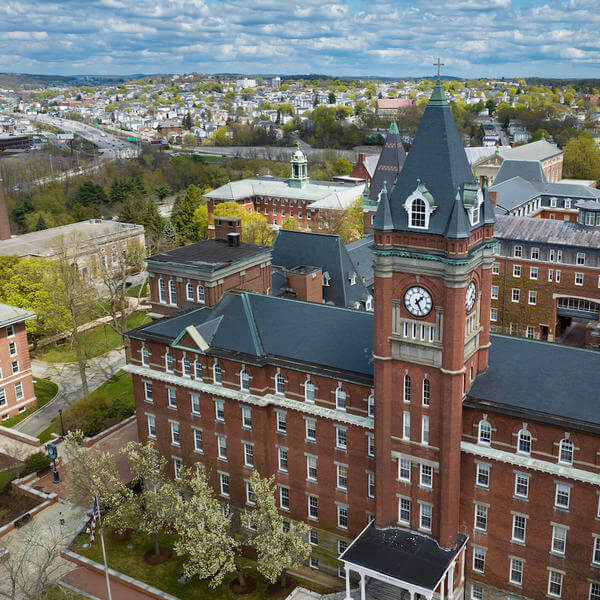Riley Millburne '24 was uncertain what lay on the other side of the doorway.
The junior, from Centerbrook, Connecticut, was about to enter a room with women who previously struggled with substance abuse. She wasn't sure how to act or how she would be received, but felt it important to expand outside her comfort zone.
The introduction came through the Anthropology of Law class at the College of the Holy Cross, which connected her and classmates with Dismas House, an organization in Worcester that works with previously incarcerated people to help their reentry into society.
"They were so receptive to us even though we’re coming in as these privileged college students who have probably never faced any sort of struggles like they have," Millburne said. "It was so powerful that they were friendly to us. We all just viewed each other as equals."
Students in the class worked with Anna Rice, an attorney at the organization, who oversees BAR None, Dismas House's communitywide legal advocacy and support program serving individuals in recovery and homeless former offenders and their families throughout the region and beyond. Through BAR None, the students worked on the issue of consumer reports related to employment. While many are familiar with criminal background checks, consumer reports dive even deeper into a person's life, including bankruptcy filings, civil court proceedings, past employment and even social media posts.
What appears on the report can prevent employers from hiring a person regardless of when an entry occurred. For example, one woman years ago worked as a hostess at a strip club. The history appeared on her consumer report and because of it, she found it difficult to find employment.
"Dismas House has a long relationship with Holy Cross," Rice said. "They’ve been generous in so many ways."
For this collaboration, Holy Cross students like Millburne examined how to better alert Worcester residents about consumer reports and even how to perhaps enact legislation. Students in Anthropology of Law, taught by visiting assistant professor Doug Bafford, gathered in groups to discuss situations like these. Rather than reading examples or topics in a textbook, the class introduced students to real people.
"What I really want students to get out of this is a sense of how the law can impact everyday life," Bafford said. "We often think of the law as something happening in a courtroom setting, perhaps far removed from everyday life."
The opportunity to leave campus and immerse themselves in the greater Worcester community came about through a partnership with the College's Donelan Office of Community-Based Learning (CBL), in which students gain an understanding of classroom topics through real-world experiences. As students gathered to discuss their work with Dismas, that central theme emerged.
"We do a lot of studying law, and reading helps, but to see concrete examples and meet them, it was really great," one student said.
Not far away, conversation in another group echoed that sentiment: "The hands-on application went beyond the macro level that we're taught in class."
For Millburne, volunteering within a community wasn't new, but that work being part of a course was. Connecting a lesson taught in class to real people only solidified the ideas Bafford presented, she said, and it also created a far more engaging learning environment: "Everyone may not always be willing to talk about the readings in class, but since everyone met someone at Dismas House, I think everyone participated with an open mind, which was really great."
Law Class Brings Students Out of the Classroom and Into Worcester

Students examine reports that could affect the future employment of previously incarcerated people.
Read Time
3 Minutes

